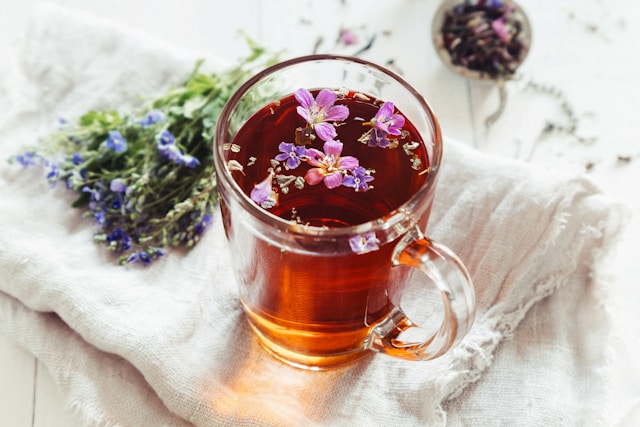Sugar, a ubiquitous ingredient in modern diets, can wreak havoc on our health, leading to weight gain, inflammation, and chronic diseases. If you’re struggling to break free from sugar’s addictive grip, a sugar detox tea can be a powerful ally.
What is a Sugar Detox Tea?
Sugar detox teas are herbal infusions designed to support the body’s natural detoxification processes and reduce sugar cravings. They typically contain a blend of herbs that promote liver function, support digestion, and regulate blood sugar levels.
Benefits of Sugar Detox Teas

- Reduced Sugar Cravings: Certain herbs, such as gymnema sylvestre and licorice root, have been shown to block sugar receptors on the tongue, reducing the desire for sugary foods.
- Improved Liver Function: The liver plays a crucial role in metabolizing sugar. Herbs like dandelion root and milk thistle support liver health, aiding in the detoxification process.
- Enhanced Digestion: Sugar can disrupt digestion, leading to bloating and discomfort. Herbs like peppermint and ginger help soothe the digestive tract and promote regularity.
- Regulated Blood Sugar Levels: Some herbs, such as cinnamon and fenugreek, have been found to slow down the absorption of sugar into the bloodstream, preventing spikes in blood sugar levels.
- Antioxidant and Anti-inflammatory Properties: Many sugar detox teas contain herbs rich in antioxidants, which protect against cellular damage caused by free radicals. Additionally, anti-inflammatory herbs like turmeric and chamomile can help reduce inflammation throughout the body.
Best Sugar Detox Teas
Numerous sugar detox teas are available on the market. Here are some of the most effective and popular options:
- Traditional Medicinals Organic Detox Tea: This blend includes dandelion root, milk thistle, and peppermint, supporting liver function, digestion, and overall detoxification.
- Yogi Detox Tea: Featuring licorice root, burdock root, and dandelion root, this tea promotes liver health, reduces bloating, and helps regulate blood sugar levels.
- Gaia Herbs Liver Cleanse Tea: This tea contains a potent combination of herbs, including dandelion root, turmeric, and schisandra berry, to support liver health and detoxification.
- Celestial Seasonings Detox Tea: This blend of cinnamon, ginger, and hibiscus helps regulate blood sugar levels, improves digestion, and provides antioxidant protection.
- Teami Detox Tea: This tea combines green tea, dandelion root, and ginger to boost metabolism, support liver function, and reduce inflammation.
How to Use Sugar Detox Teas
To maximize the benefits of sugar detox teas, follow these tips:
- Drink Regularly: Aim for 2-3 cups of tea per day, preferably between meals.
- Steep for 5-10 Minutes: Allow the tea to steep fully to extract the maximum nutrients.
- Add Honey or Lemon: If desired, add a small amount of honey or lemon to enhance the flavor.
- Avoid Artificial Sweeteners: Sugar detox teas should be consumed without artificial sweeteners, which can disrupt the detoxification process.
What are some natural ways to reduce sugar cravings besides using sugar detox teas?
Natural Ways to Reduce Sugar Cravings Besides Using Sugar Detox Teas
- Eat a balanced diet: Focus on consuming whole, unprocessed foods such as fruits, vegetables, lean protein, and whole grains. These foods provide sustained energy and help regulate blood sugar levels, reducing cravings for sugary snacks.
- Get enough sleep: Sleep deprivation can disrupt hormone levels, leading to increased sugar cravings. Aim for 7-9 hours of sound sleep every night.
- Manage stress: Stress can trigger sugar cravings as a coping mechanism. Exercise, meditation, or spending time outside can all help to reduce stress.
- Stay hydrated: Dehydration can sometimes be mistaken for hunger or sugar cravings. Drink plenty of water throughout the day to stay hydrated and reduce false cravings.
- Eat regular meals: Skipping meals can lead to blood sugar fluctuations and increased sugar cravings. Eat regular, balanced meals throughout the day to keep your blood sugar levels stable.
- Choose healthy snacks: When you need a snack, reach for nutrient-rich options such as fruits, vegetables, nuts, seeds, or yogurt. These snacks provide fiber and other nutrients that help satisfy hunger and reduce cravings.
- Avoid artificial sweeteners: Artificial sweeteners can actually increase sugar cravings in the long run. Instead, opt for natural sweeteners like honey, maple syrup, or stevia in moderation.
- Get regular exercise: Exercise helps regulate blood sugar levels and releases endorphins, which have mood-boosting effects and can reduce cravings.
- Consider chromium supplements: Chromium is a mineral that helps regulate blood sugar levels and may reduce sugar cravings. Talk to your doctor before taking any supplements.
- Practice mindful eating: Pay attention to your hunger and fullness cues. Eat slowly and savor your food, noticing the flavors and textures. This can help you avoid overeating and mindless snacking.
Remember that eliminating sugar cravings requires time and effort. Be patient with yourself and focus on making gradual changes to your diet and lifestyle. By implementing these natural strategies, you can effectively curb your sugar cravings and improve your overall health.
Are there any other natural sweeteners besides honey, maple syrup, and stevia that I can use in moderation?
Yes, there are several other natural sweeteners besides honey, maple syrup, and stevia that you can use in moderation:
- Monk fruit extract: This natural sweetener is derived from the monk fruit, a melon native to Southeast Asia. It is about 300 times sweeter than sugar but contains no calories or carbohydrates.
- Erythritol: A sugar alcohol that is naturally found in some fruits and vegetables. It is about 60-70% as sweet as sugar but contains almost no calories or carbohydrates.
- Xylitol: Another sugar alcohol that is commonly used as a sugar substitute. It is about as sweet as sugar but contains about 40% fewer calories.
- Yacon syrup: A natural sweetener derived from the roots of the yacon plant. It is about 60% as sweet as sugar and contains prebiotics, which are beneficial for gut health.
- Allulose: A rare sugar that is naturally found in small amounts in some fruits. It is about 70% as sweet as sugar but contains only about 1/10th of the calories.
These natural sweeteners can be used in moderation to add sweetness to foods and beverages without the negative health effects of sugar. However, it is important to note that some sugar alcohols, such as erythritol and xylitol, can cause digestive issues in some people if consumed in large amounts.
When using natural sweeteners, it is important to read the labels carefully and choose products that are unsweetened or contain minimal amounts of added sweeteners. You should also be mindful of your overall sugar intake, even from natural sources, to maintain a healthy diet.
Conclusion
Sugar detox teas can be a valuable tool in your journey to reduce sugar consumption and improve your overall health. By supporting liver function, digestion, blood sugar regulation, and antioxidant protection, these teas can help you break free from sugar’s addictive grip and reclaim your health.







